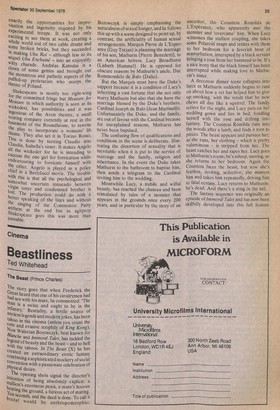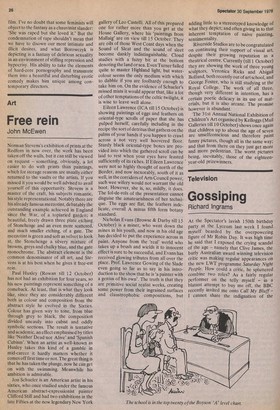Cinema
Beastliness
Ted Whitehead
The Beast (Prince Charles) The story goes that when Frederick the Great heard that one of his cavalrymen had had sex with his mare, he commented: 'The Man is a swine and ought to be in the infantry.' Bestiality, a fertile source of ancient legends and modern jokes, has been taboo in the cinema (unless you count the Cute and evasive zoophily of King Kong). Now Walerian Borowczyk, best known for Blanche and Immoral Tales, has tackled the legend of beauty and the beast — and to hell With the taboos. -In The Beast (X) he has created an extraordinary erotic fantasy combining a sophisticated mockery of social convention with a passionate celebration of Physical desire. The opening shots signal the director's intention of being absolutely explicit: a stallion's enormous penis, a mare's hooves beating the ground, a furious act of mating. Ten seconds, and the deed is done. To call it brutal would be anthropomorphic; Borowczyk is simply emphasising the naturalness of sexual hunger, and he follows this up with a scene designed to point up, by contrast, the artificiality of human sexual arrangements. Marquis Pierre de L'Esperance (Guy Trejan) is planning the marriage of his son, Mathurin (Pierre Benedetti), to an American heiress, Lucy Broadhurst (Lisbeth Hummel). He is opposed for obscure reasons by Mathurin's uncle, Duc Rommondelo de Balo (Dalio). But the Marquis must have the Duke's support because it is a condition of Lucy's inheriting a vast fortune that she not only marry Mathurin but also that she have the marriage blessed by the Duke's brothers, Cardinal Joseph de Balo (Jean Martinelli). Unfortunately the Duke, and the family, are out of favour with the Cardinal because for unexplained reasons, Mathurin has never been baptised. The confusing flow of qualifications and conditions in the scene is deliberate, illustrating the distortion of sexuality that is inevitable when it is put to the service of marriage and the family, religion and inheritance. In the event the Duke takes Mathurin to the bathroom to baptise him, then sends a telegram to the Cardinal inviting him to the wedding.
Meanwhile Lucy, a nubile and wilful beauty, has reached the chateau and been stimulated by tales of a monster that appears in the grounds once every 200 years, and in particular by the story of an ancestor, the Countess Rom ilda de L'Esperance, who apparently met the monster and 'overcame' him. When Lucy witnesses the stallion coupling, she takes some Polaroid snaps and retires with them to her bedroom • for a feverish bout of masturbation, interupted by a black servant bringing a rose from her husmand to be. It's a nice irony that the black himself has been interrupted while making love to Mathurin's sister.
A decorous dinner scene collapses into farce as Mathurin suddenly begins to rant on about how a vet has helped him to give up smoking, with the result that he now chews all day like a squirrel. The family retires for the night, and Lucy puts on her wedding gown and lies in bed, fondling herself with the rose and drifting into fantasy. The Countess Romilda runs into the woods after a lamb, and finds it torn to pieces. The beast appears and pursues her; as she runs, her clothing — which is pretty voluminous — is stripped from her. The beast catches her and rapes her. Lucy goes to Mathurin's room; he's asleep, snoring, so she returns to her bedroom. Again the Countess faces the beast, but now she's fearless, inviting, seductive; she masters him and takes him repeatedly, driving him to fatal ecstasy. Lucy returns to Mathurin: he's dead. And there's a sting in the tail.
The fantasy sequence was originally an episode of Immoral Tales and has now been skilfully developed into this full feature film. I've no doubt that some feminists will object to the fantasy as a chauvinist slander: 'She was raped but she loved it.' But the condemnation of rape shouldn't mean that we have to disown our most intimate and illicit desires, and what Borowczyk is depicting is a fantasy of delirious sexuality in an environment of stifling repression and hypocrisy. His ability to take the elements of hard-core pornography and transmute them into a beautiful and disturbing erotic comedy makes him unique among contemporary directors.



































 Previous page
Previous page